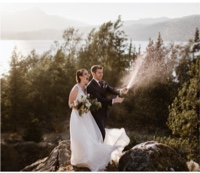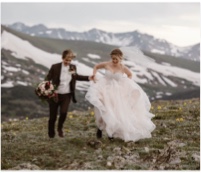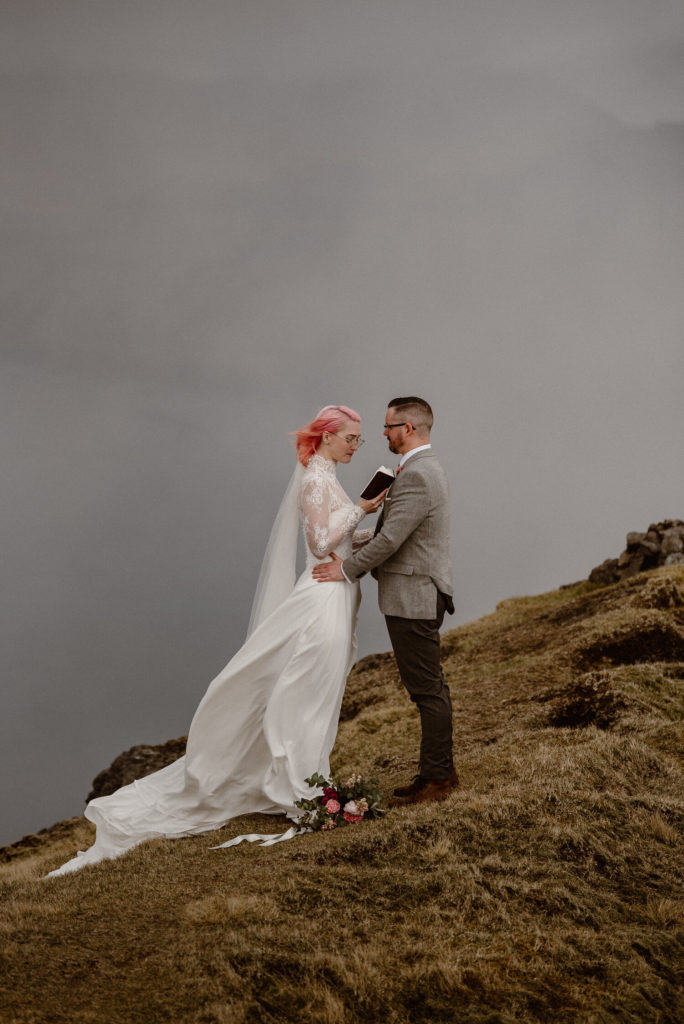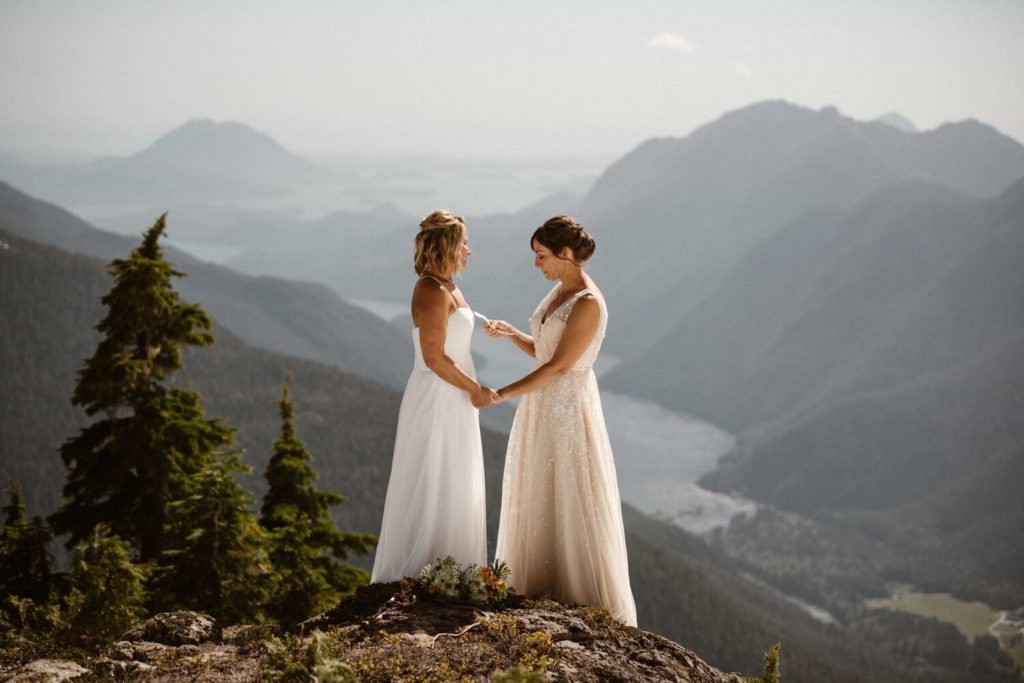 Table of Contents
Table of Contents
There are many different ways for couples to commit their lives together, and one of those celebrations is called a commitment ceremony. You might not have heard of it before, but I’m willing to bet you know someone who had one! In fact, almost 90% percent of the elopements we photograph are actually commitment ceremonies, and we want to answer any questions you might have about this type of wedding celebration.
What is a commitment ceremony? Is it the same as getting married? What’s the difference between a commitment ceremony vs. a marriage ceremony? Are we really married if we only have a commitment ceremony? What will people think if we invite them to a commitment ceremony but they think it’s not a real wedding?
Commitment ceremonies are very real marriage ceremonies, without the stress and red tape of becoming legally married on the same day you share your vows. Our goal is to help couples plan elopements that perfectly suit their vision of what a perfect wedding day should look like, and a commitment ceremony is one of our favorite ways to help craft an authentic true-to-you celebration!
What is a commitment ceremony?
Commitment ceremonies are very real ceremonies, just without the stress and red tape of a legal ceremony on the same day you share your vows. Meaning, it’s a chance for couples to say their vows, or have a ceremony around their personal beliefs and values. There are no restrictions on commitment ceremonies, you can have a friend sing your vows with you, you don’t need a judge or civil officiant, you can interpretively dance your feelings, and you can even self-solemnize in several states (including Colorado)! Our goal is to help couples plan elopements that perfectly suit their vision of what a perfect wedding day should look like, and a commitment ceremony is one of our favorite ways to help craft an authentic true-to-you celebration!
DEFINTION:
A commitment ceremony is a marriage ceremony in which two people commit their lives to each other, but it isn’t legally binding.
Commitment ceremonies can even look the same as legally binding weddings, but at no point does the couple go off to sign paperwork and make the marriage legal by government standards. You might have attended a wedding ceremony in the past that was actually a commitment ceremony, and you didn’t even know it!
Other names for commitment ceremonies are “spiritual” “symbolic” or “promise” ceremonies. For us, and those that have commitment ceremonies, they are just as valid and important to a relationship as having one with civil (government) backing. Many of our clients also choose to do the legal ceremony or paperwork before or after their commitment ceremony; ultimately, the choice is yours and what best reflects your values and what’s important to the two of you.
Why Would Someone Choose to Have a Commitment Ceremony?
There are many reasons couples choose a commitment ceremony instead of a legally binding one. For some, their partnership might not be legal in their country or region, others might not want to have a legal marriage, or sometimes it’s just inconvenient or impossible to be legally married at the same time as a ceremony if couples want to follow through with their dream wedding. Every couple’s situation is unique, but we see three main reasons couples often choose to plan commitment ceremonies for their elopements.
1. Couples Who Cannot Get Married By Law
We’ve been photographing weddings long enough to have witnessed the shift when marriage equality passed in the United States. Before then, many same-sex marriage ceremonies we photographed were actually commitment ceremonies because the U.S. did not accept those marriages nationwide. Once marriage equality passed, same-sex couples could finally sign the paperwork and make things official. Unfortunately, same-sex marriage is still illegal in parts of the world, but people deserve the right to commitment and marriage. As a result, until marriage equality becomes law everywhere, LGBTQ+ couples in regions where their love is illegal only have the option to share vows via a commitment ceremony.
Commitment ceremonies for straight couples are just as common, but happen under different circumstances. Many of our couples married legally at a previous time, maybe for children, taxes, or immigration reasons, but they didn’t have a ceremony and celebration, so they have a commitment ceremony at a later date. Sometimes past relationships (divorces, separations, etc.) haven’t been finalized, so a commitment is a way to celebrate while waiting for other details to catch up.
Finally, many polyamorous couples choose a commitment ceremony as their relationship is not legally recognized. Commitment ceremonies allow these groups to celebrate their love and relationship, without government approval.
2. Couples Who Don’t Want To Be Legally Married
The second group of people who choose to have commitment ceremonies are those who want to get married, but don’t want to be legally married. Reasons for this are varied, and usually personally. For example, they might be financially disadvantaged as a married couple in the eyes of the law, sometimes this is due to taxes, disability benefits, or a variety of other needs. Some couples are not religious, and the institution of marriage as defined by the state doesn’t appeal to them but they want to commit to each other anyway, in their own way. For these couples, a commitment ceremony serves their purpose of committing their lives to each other ceremonially, without ever having to answer to the government on the status of their relationship.
3. Couples Inconvenienced By Getting Legally Married
Sometimes it’s simply impossible or inconvenient to get legally married on the same day as your ceremony. Destination weddings are often hard to plan as legal ceremonies, for instance. Many of the couples we work with choose to have their ceremony in a different country or state from where they live, and the laws in those destinations can be prohibitive or complicated if you don’t live there. For example: If you get married in a country where you aren’t a citizen, it can take months to get a notarized copy of your marriage certificate, if you can get one at all! Some countries also have very restrictive laws regarding a legal marriage. They might only recognize ceremonies that occur indoors at a religious institution, and you want to say your vows outdoors. Some places require blood tests, waiting periods, or even ask you to arrive weeks in advance and apply for your license in person. Depending on the state or country, you might need to find an officiant or witnesses willing to cooperate with your ceremony vision. All these loopholes, red tape, and coordination can be a hindrance to your unique vision for your day. Our motto is: If it’s getting in the way of you having the best day of your life, cut it out! The legal paperwork can be seen as just that, paperwork. Do whatever is advantageous and sensible for you.
Maddie has personal experience planning a commitment ceremony
When I got married, we exchanged vows and had a commitment ceremony in Peru despite being from the United States and Scotland. We had already signed all the paperwork nine months prior, but we consider the mountain top ceremony in Peru to be the day we got married. It just simply didn’t align with our vision for our wedding day to be inconvenienced by the logistics of attempting to become legally married in a country halfway around the world from where we live. Our day was about our wants, our needs, and our vision – no one else. The government didn’t play a part in our commitment to each other, and that’s exactly the way we wanted our wedding to be.
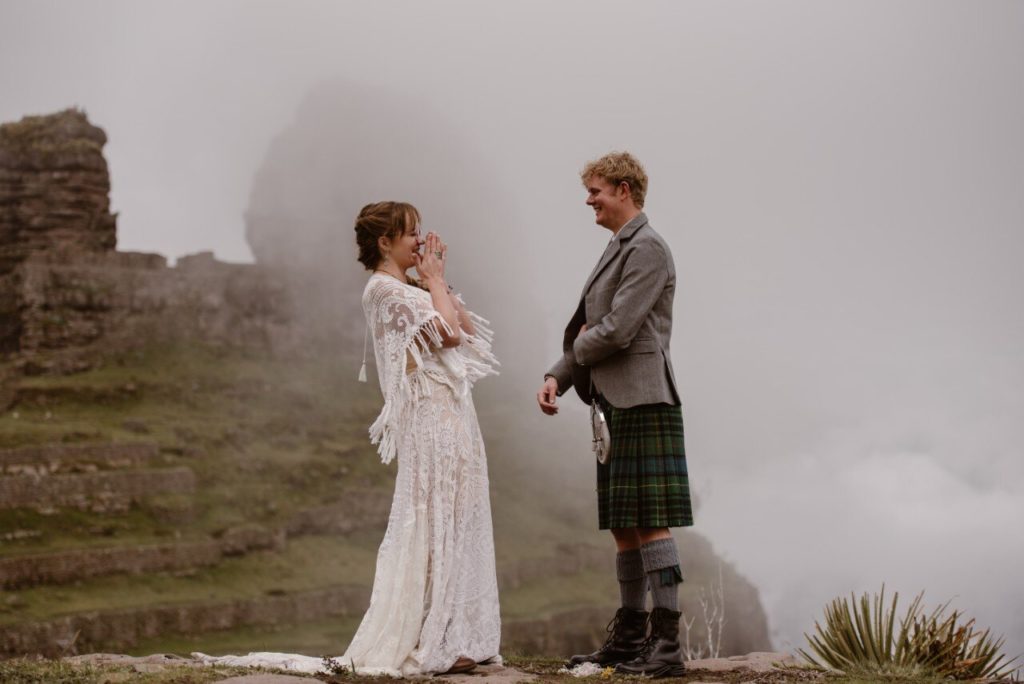
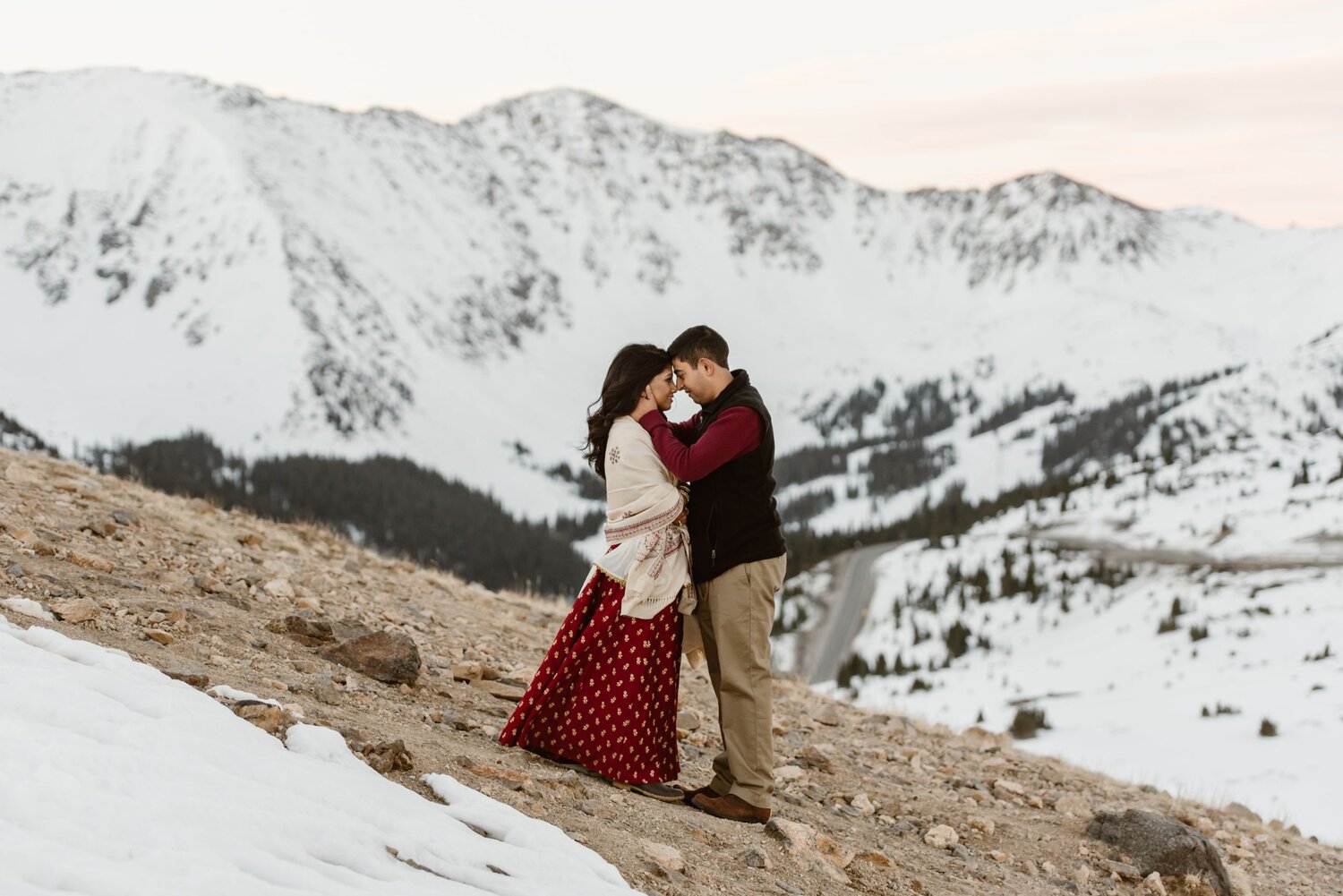
Pros & Cons of Commitment Ceremonies
We’ll be the first to admit that we believe there are way more pros than cons to getting married with a commitment ceremony! However, depending on your personal beliefs and perspective, some of these cons might hold weight, so you should choose the avenue right for you and your relationship. Whatever you choose to do, we’ll support you 100%! At the end of the day, if you do a commitment ceremony and your paperwork on another day, you two can get married anywhere in the world you want. Less stress, less expense, no rules or restrictions.
Pros
1. You Can Get Married Wherever & Whenever You Want!
You don’t want to worry about laws, or finding an officiant and witnesses. If you can travel there, you can say your vows there. If you want to get married now, but your state has a waiting period, let’s go! Say your vows, commit your lives to each other, and sign the papers whenever it’s convenient for you. If you do a commitment ceremony and your paperwork on another day, you two can get married anywhere in the world you want. Less stress, less expense, no rules or restrictions.
2. You Don’t Have To Deal With Paperwork!
If signing paperwork on the day of your wedding sounds like a chore, you don’t have to do it. We love being based in Colorado because you can self-solemnize on your wedding day, but few other locations are so flexible. Signing the legal documents on the day of your wedding means coordinating with more people than just you and your partner.
3. The Ceremony Can Be Performed Using Language That Means Something To You!
Getting legally married often involves specific step-by-step instructions or jargon that might not feel personally relevant to you or your partner. For commitment ceremonies there’s no script and you can say exactly what you want to in your vows. Another bonus benefit of commitment ceremonies is that you can have anyone officiate! If you want your friend, mom, or dog to be the person standing with you and your partner during the ceremony, they don’t have to be a legal celebrant.
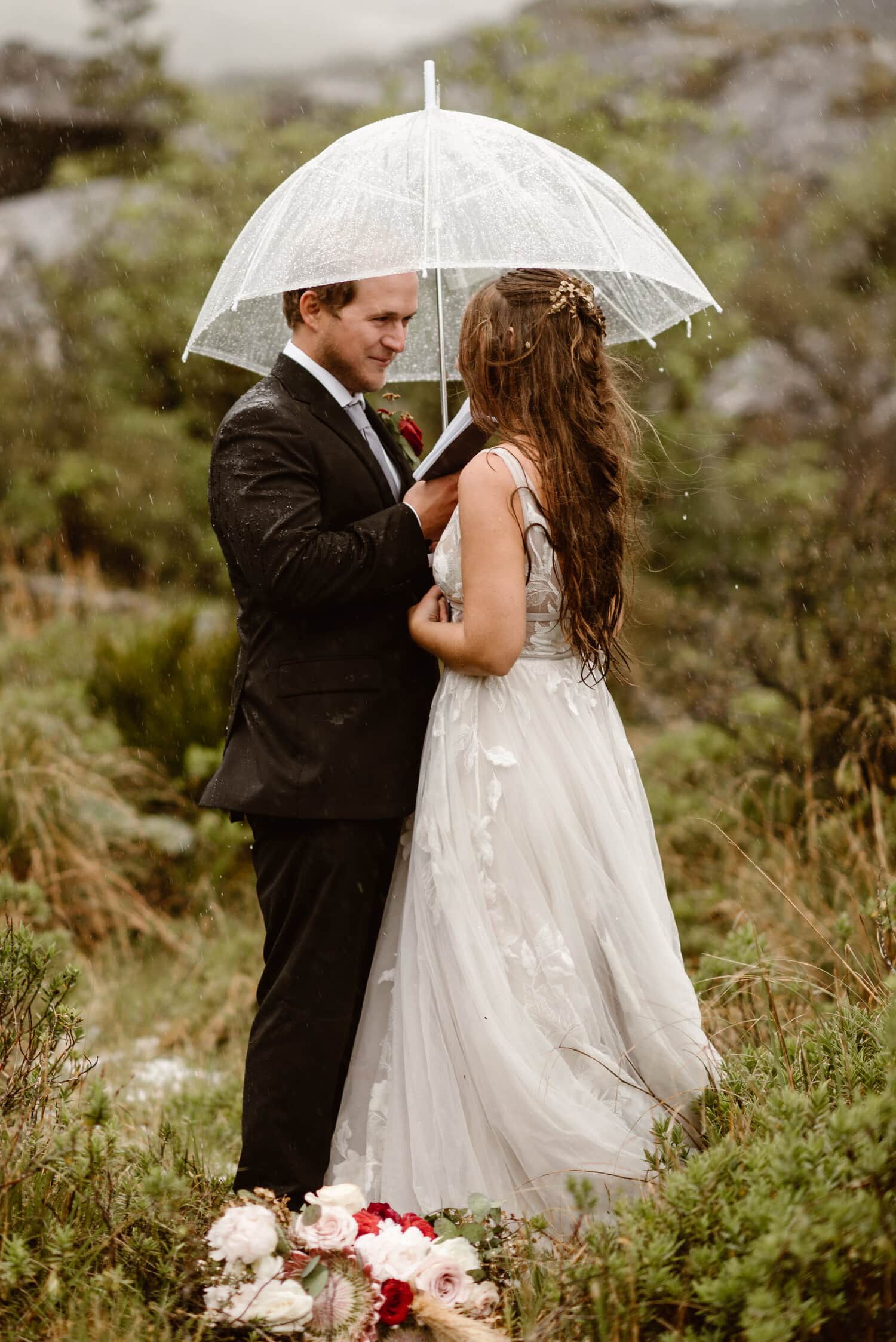
Cons
1. You Might Have Two Anniversaries, Sort Of.
Depending who you are, this could be a pro or a con. Should you decide to have a commitment ceremony AND go the legal route on a different date than your ceremony, this results in two anniversaries! You can choose to ditch the legal date and focus on your ceremony anniversary, or this can be an opportunity to embrace more opportunities to celebrate your relationship. Pro tip: when you’re filling out official paperwork in the future, you’ll need to remember which date it is that the government thinks you got married.
2. Until You’re Legally Married, You Can’t Claim Benefits
Unless you go through getting legally married, you usually can’t claim any marriage-related benefits. You’ll have to check “single” on official documents and it is harder to change your name if you don’t have a marriage certificate as your supporting document. However, sometimes common law benefits may apply, so it’s worth checking into your state or country’s exact laws and regulations.
3. Some Old-Fashioned Family Members Might Not Approve
We are firm believers that those who love you, should support your marriage decisions. However, we also recognize that some family members might have a hard time understanding the purpose of a marriage ceremony that isn’t legally or religiously binding. Religion or personal experience could be a reason some feel uneasy viewing a commitment ceremony as a “real” marriage, but don’t let that dissuade you from having the ceremony that works for you and makes you happy!
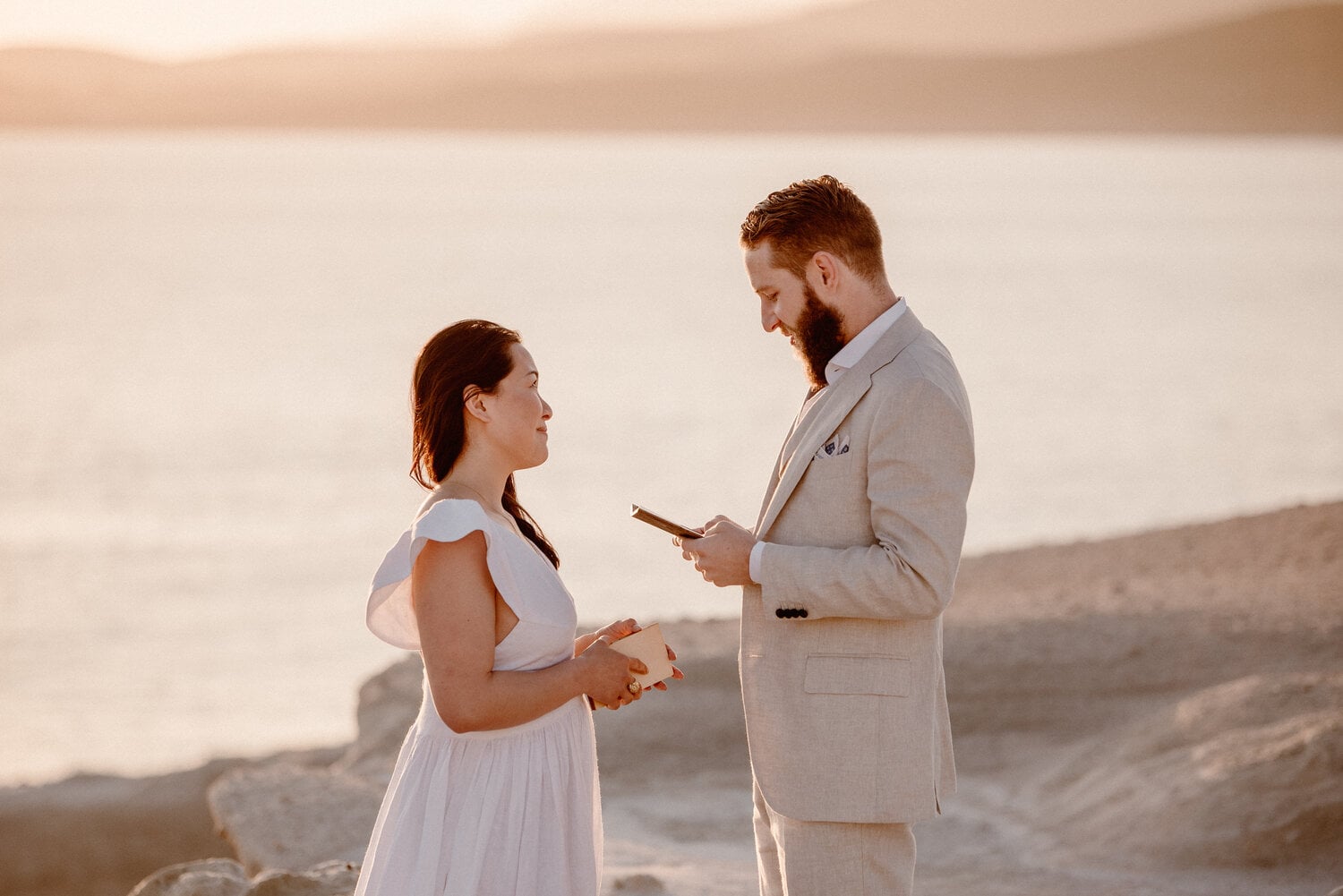
How to Plan a Commitment Ceremony
Planning a commitment ceremony is not that different from planning an elopement or wedding ceremony. Vow and ring exchanges are common to every ceremony, but the words and details you wish to add are what makes it unique and special for your relationship. You can also throw out the book and only do things that matter to you. Want to get matching tattoos instead of a ring? Let’s go! Feel like doing your vows and then cliff jumping? HELL YEAH! Regardless of what you choose, just make sure it brings you joy and meaning that is exclusively for you.
Get started by asking yourselves these questions:
- Where do you want to get married?
- What activities do you want to engage in on your wedding day?
- Do you want an officiant who is okay with performing a non-legal ceremony, or do you want to self solemnize?
- Do you want to invite guests or do you want it to just be the two of you?
Check out this blog on elopement ceremony ideas for more inspiration!
Personalize Who You Celebrate With
Some of our favorite ways to personalize commitment ceremonies are to write personal vows, read letters from friends or family members, or find other ways to incorporate loved ones into your day even when they aren’t physically present.
One of our couples had a friend provide a voice recording, which they played to walk them through their ceremony. Even though the couple chose to not invite guests, the recording was their way of feeling that their close friend was helping guide them through the vow exchange.
If you invite friends, ask one of them to guide you! They don’t have to be ordained to officiate a commitment ceremony. Get weird and quirky and authentically you! Remember, this is your chance to celebrate your relationship in any way that is meaningful to you. The sky’s the limit on what traditions you want to perform and incorporate in the ceremony.
A Note on Officiants: If you DO choose to get legally married on your wedding day – all three photographers are ordained! In most states, we can legally sign your marriage certificate, and there are creative ways to find witnesses if you need those too!
Activities Make it Better
WE LOVE ACTIVITIES! Seriously! Activities on an elopement day, whether part of your ceremony or just part of your day. Our couples that pick activities that they either already love going to do, or trying someone new! As we have thrown out the rule book on weddings, ceremonies, and receptions, you can pick whatever you want.
Some of our faves:
- Sand boarding
- Skiing
- Hiking
- Horseback Riding
- Hot Air Ballooning
- Cliff Jumping
- Off-Roading
- Canoeing
- Hammocking
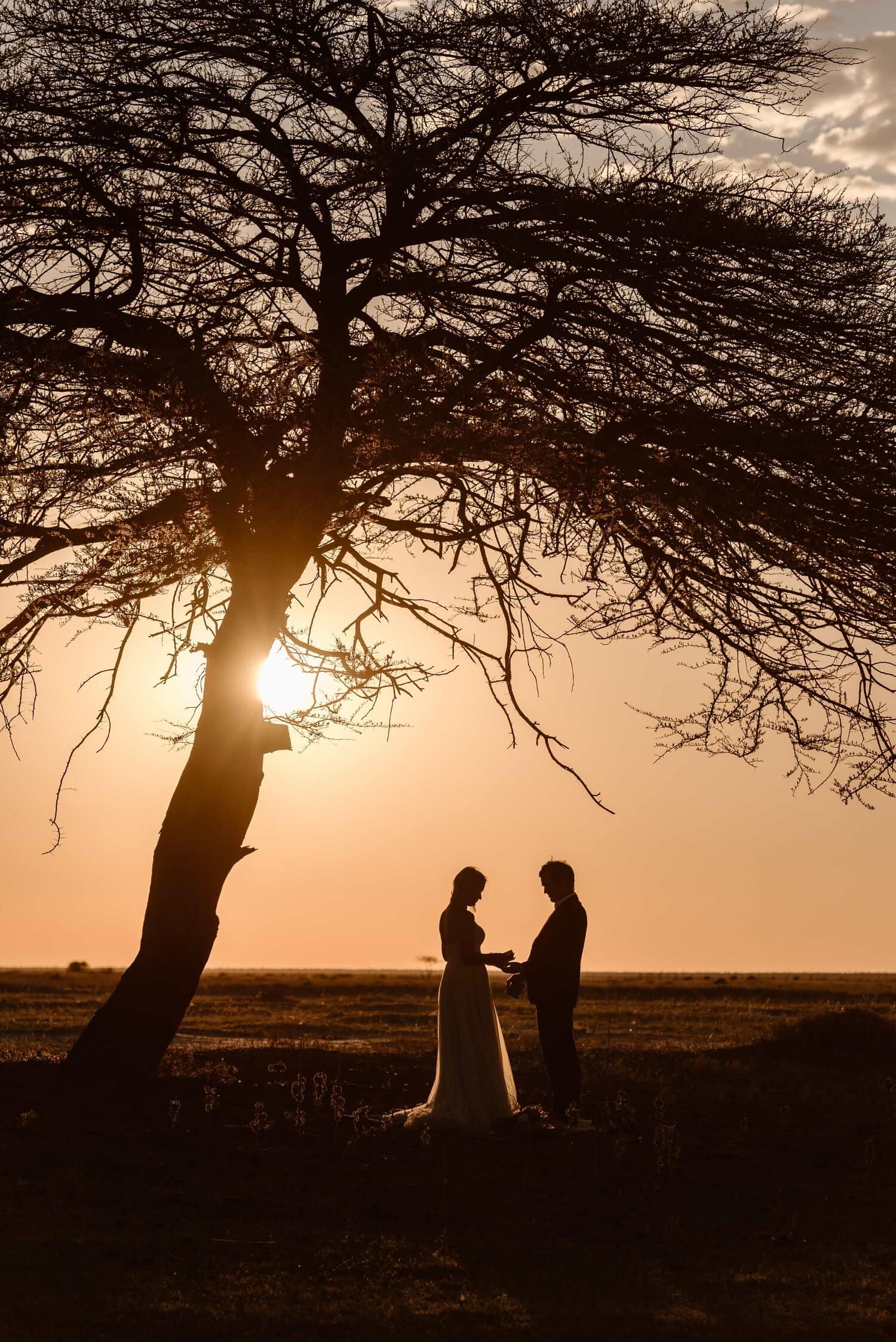
Frequently Asked Questions about Commitment Ceremonies
No, but that doesn’t make it any less important! For more FAQs about the legalities of eloping, check out our blog.
Anyone who is willing to. If you ask someone to officiate, be up front that it isn’t legally binding.
Just the paperwork.
Civil ceremonies are legally binding. It’s usually done by government entities without a religious component.
We love the freedom of commitment ceremonies for couples who want to get married their own way
We encourage our couples to not let government paperwork hold them back from a wedding experience that is truly them, meaningful, intimate, and everything they’ve ever wanted out of their elopement location. You want to look back on your wedding day, on the day that you say your vows to each other, and love every single minute of it! No one should love your wedding experience more than you do. If doing the legal paperwork on that same day is a hassle, time consuming, stressful, expensive, or restrictive in any way – it is so easy and so worth it to ditch the legal side of things. You’ll still be getting married!
Are you ready to start planning your own commitment ceremony?
If this type of wedding celebration sounds like the answer to what you’ve been looking for, we’re here to support you and help you in any way we can! We’ll help craft your personalized wedding day experience – starting with location scouting lists, planning tools, and recommendations to ensure you get to celebrate your wedding your way. We want your unique vision of your perfect wedding day to come true!






